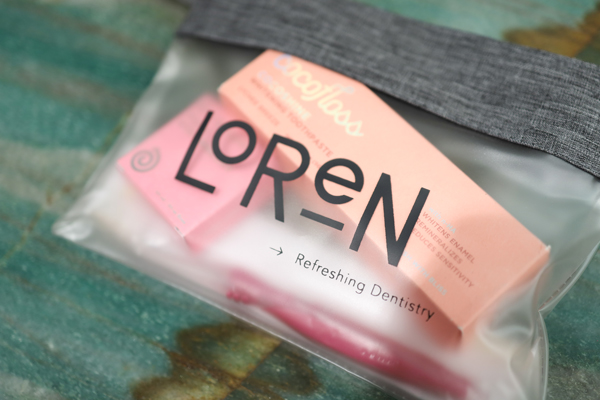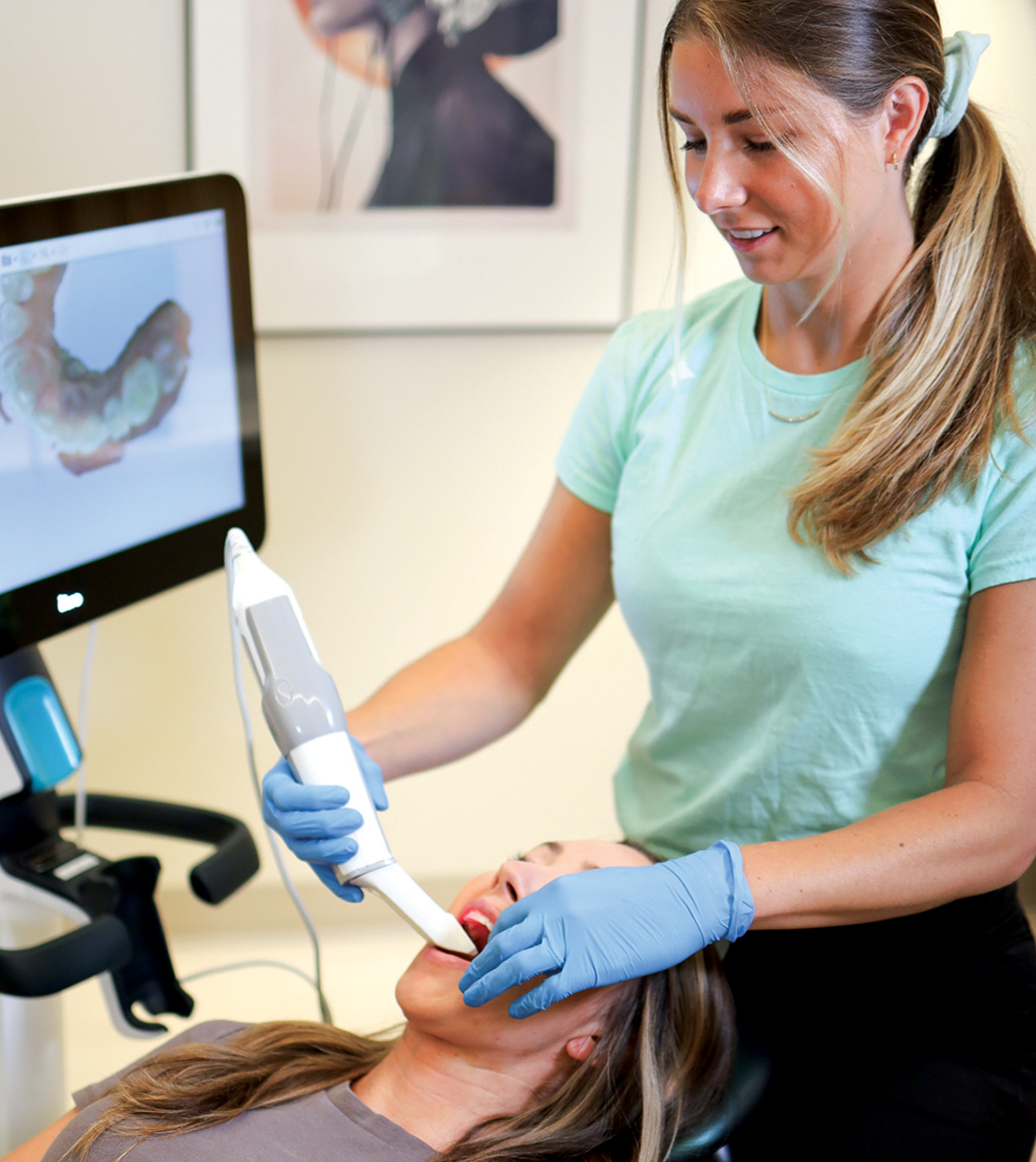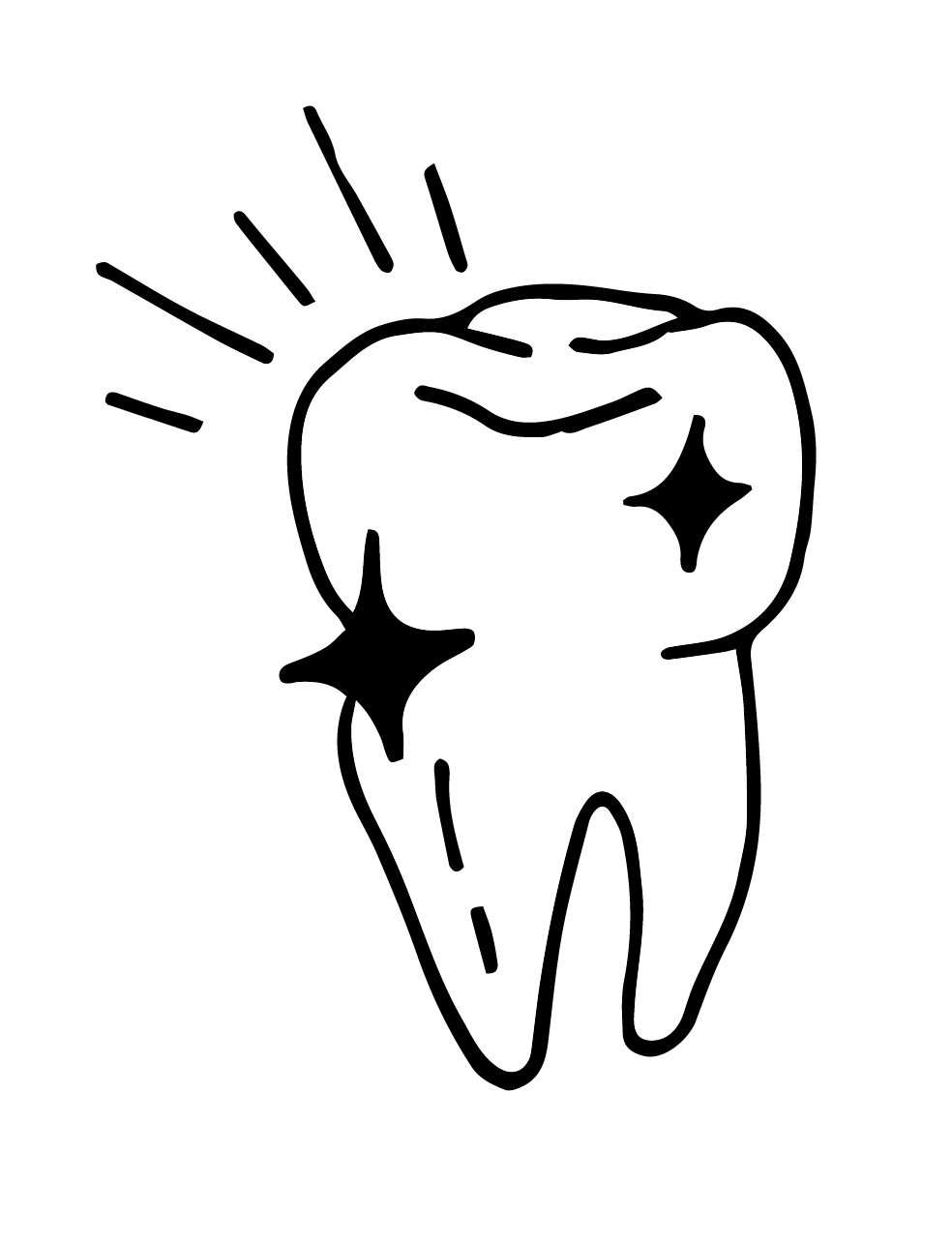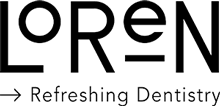
The Dental Refresh
This isn’t just another cleaning appointment in Raleigh, NC—this is a new dental experience we call The Dental Refresh..
Visit our Raleigh dentist office for personalized concierge check-in and customized refresh menus—complete with flavor options and indulgent self-care enhancements. Every detail is designed for your comfort and care and you can relax and enjoy your self-care experience in one of our luxurious, state-of-the-art designer studios in downtown Raleigh, NC. At Loren, exceptional dental care isn’t just a service, it’s a way of life.


Professional Dental Cleaning
Professional dental cleanings (dental prophylaxis) are usually performed by Registered Dental Hygienists in our Raleigh dental clinic. Your cleaning appointment will include a dental exam and the following:
-
 Removal of calculus (tartar)
Removal of calculus (tartar)
Calculus is a hardened plaque that has been left on the tooth for some time and is now firmly attached to the tooth surface. Calculus forms above and below the gum line and can only be removed with special dental instruments. This dental cleaning makes a difference.
-
 Removal of plaque
Removal of plaque
Plaque is a sticky, almost invisible film that forms on the teeth. It is a growing colony of living bacteria, food debris, and saliva. The bacteria produce toxins (poisons) that inflame the gums. This inflammation is the start of periodontal disease! No other dentist in Raleigh, NC can match our thoroughness!
-
 Teeth polishing
Teeth polishing
Remove stain and plaque that is not otherwise removed during tooth brushing and scaling. Our teeth cleaning will help make your smile 100%.
New Patient Special
$188 Cleaning, Exam, & X-RayNew Patient Special
$188 Cleaning, Exam, & X-Ray
New Patient Special
$99 Emergency Dental Care in Raleigh, NCFor an emergency dentist in Raleigh, NC, call or text us at 919-885-0860.
New Patient Special
$99 Emergency Dental Care in Raleigh, NCFor an emergency dentist in Raleigh, NC, call or text us at 919-885-0860.
The Cleaning Menu
STEP ONE: Select Your Paste Flavor
It’s Happy Hour:
- Mint
- Mint Mojito
- Strawberry Margarita
- Piña Colada
STEP TWO: Select Your Cocofloss Flavor
- Mint
- Strawberry
- Orange
- Coconut
STEP THREE: Select Your Self-Care Add-Ons
- Nitrous (Laughing Gas) – $199
- Fluoride – $30

FAQs to our Raleigh dentists
We offer our expertise to you for all your dental needs. Please reach out for additional details – we’re here to assist you. Our dental office in Raleigh, NC offers there very best oral care available.
Digital X-Rays
Digital X – Rays
Digital radiography (digital X-ray) is the latest technology used to take dental X-rays.
The Latest Technology Used To Take Dental X-Rays
Dental X-rays are essential, preventative, diagnostic tools that provide valuable information not visible during a regular dental exam.
Digital Radiography
Digital radiography (digital X-ray) is the latest technology used to take dental X-rays. This technique uses an electronic sensor (instead of X-ray film) that captures and stores the digital image on a computer. This image can be instantly viewed and enlarged, helping the dentist and dental hygienist detect problems more easily. Digital X-rays reduce radiation by 80-90% compared to the already low exposure of traditional dental X-rays.
Dental X-rays are essential, preventative, diagnostic tools that provide valuable information not visible during a regular dental exam. Dentists and dental hygienists use this information to safely and accurately detect hidden dental abnormalities and complete an accurate treatment plan. Without X-rays, problem areas may go undetected.
Dental X-Rays May Reveal:
- Abscesses or cysts.
- Bone loss.
- Cancerous and non-cancerous tumors.
- Decay between the teeth.
- Developmental abnormalities.
- Poor tooth and root positions.
- Problems inside a tooth or below the gum line.
Detecting and treating dental problems at an early stage may save you time, money, and unnecessary discomfort; not to mention, it may save your teeth as well!
Are Dental X-Rays Safe?
Digital X-rays produce a significantly lower level of radiation compared to traditional dental X-rays. Not only are digital X-rays better for the health and safety of the patient, but they are also faster and more comfortable to take, which reduces your time in the dental office. Also, since the digital image is captured electronically, there is no need to develop X-rays, thus eliminating the disposal of harmful waste and chemicals into the environment.
Even though digital X-rays produce a low level of radiation and are considered very safe, dentists still take necessary precautions to limit the patient’s exposure to radiation. These precautions include only taking those X-rays that are necessary and using lead apron shields to protect the body.
How Often Should Dental X-Rays Be Taken?
The need for dental x-rays depends on each patient’s individual dental health needs. Your dentist and dental hygienist will recommend necessary x-rays based upon the review of your medical and dental history, a dental exam, signs and symptoms, your age, and risk of disease.
A full mouth series of dental x-rays is recommended for new patients. A full series is usually good for three to five years. Bite-wing x-rays (x-rays of top and bottom teeth biting together) are taken at recall (check-up) visits and are recommended once or twice a year to detect new dental problems.
Dental Sealants
Sealants
Sealants can protect teeth from decay for many years.
What Is A Dental Sealant?
A sealant protects the tooth by sealing deep grooves, creating a smooth, easy-to-clean surface. This makes them an excellent option for not only adults, but all children, teenagers, and even babies.
What You Should Know About Dental Sealants
A sealant is a thin, plastic coating applied to the chewing surface of molars, premolars, and any deep grooves (called pits and fissures) of teeth. More than 75% of dental decay begins in these deep grooves. Teeth with these conditions are hard to clean and are very susceptible to decay. A sealant protects the tooth by sealing deep grooves, creating a smooth, easy-to-clean surface.
Sealants can protect teeth from decay for many years but need to be checked for wear and chipping at regular dental visits.
Reasons For Sealants:
- Children and teenagers – As soon as the six-year molars (the first permanent back teeth) appear or any time throughout the cavity-prone years of 6-16.
- Adults – Tooth surfaces without decay that have deep grooves or depressions.
- Baby teeth – Occasionally done if teeth have deep grooves or depressions and the child is cavity-prone.
Fluoride Treatment
Fluoride Treatment
The most effective agent available to help prevent tooth decay.
Tested & Proven
The benefits of fluoride have been well-known for over 50 years and are supported by many health and professional organizations.
What Is Fluoride & What Is It For?
Fluoride is the most effective agent available to help prevent tooth decay. It is a mineral that is naturally present in varying amounts in almost all foods and water supplies. The benefits of fluoride have been well-known for over 50 years and are supported by many health and professional organizations.
Fluoride Works In Two Ways:
- Topical fluoride strengthens the teeth once they have erupted by seeping into the outer surface of the tooth enamel, making the teeth more resistant to decay. We gain topical fluoride by using fluoride-containing dental products such as toothpaste, mouth rinses, and gels. Dentists and dental hygienists generally recommend that children have a professional application of fluoride twice a year during dental check-ups.
- Systemic fluoride strengthens the teeth that have erupted as well as those that are developing under the gums. We gain systemic fluoride from most foods and our community water supplies. It is also available as a supplement in drop or gel form and can be prescribed by your dentist or physician. Generally, fluoride drops are recommended for infants, and tablets are best suited for children up through the teen years. It is very important to monitor the amounts of fluoride a child ingests. If too much fluoride is consumed while the teeth are developing, a condition called fluorosis (white spots on the teeth) may result.
Why Use Fluoride
Although most people receive fluoride from food and water, sometimes it is not enough to help prevent decay. Your family dentist or dental hygienist may recommend the use of home and/or professional fluoride treatments for the following reasons:
- Deep pits and fissures on the chewing surfaces of teeth.
- Exposed and sensitive root surfaces.
- Fair to poor oral hygiene habits.
- Frequent sugar and carbohydrate intake.
- Inadequate exposure to fluorides.
- Inadequate saliva flow due to medical conditions, medical treatments, or medications.
- Recent history of dental decay.
Remember, fluoride alone will not prevent tooth decay! It is important to brush at least twice a day, floss regularly, eat balanced meals, reduce sugary snacks, and visit your dentist on a regular basis.
If you are seeking teeth whitening in Raleigh, NC, reach out to us as well.

Confidence Looks Good on You
Picture this: You leave work and stroll through downtown Raleigh, heading to your self-care cleaning appointment. A cozy seat in our stylish lobby and a complimentary beverage are ready for you. Soon, you’re escorted to one of our designer Studios for your personalized appointment. Before you know it, you’re walking out with a chic tote of handpicked dental care products. Welcome to modern dentistry, where your spa-like experience awaits.
